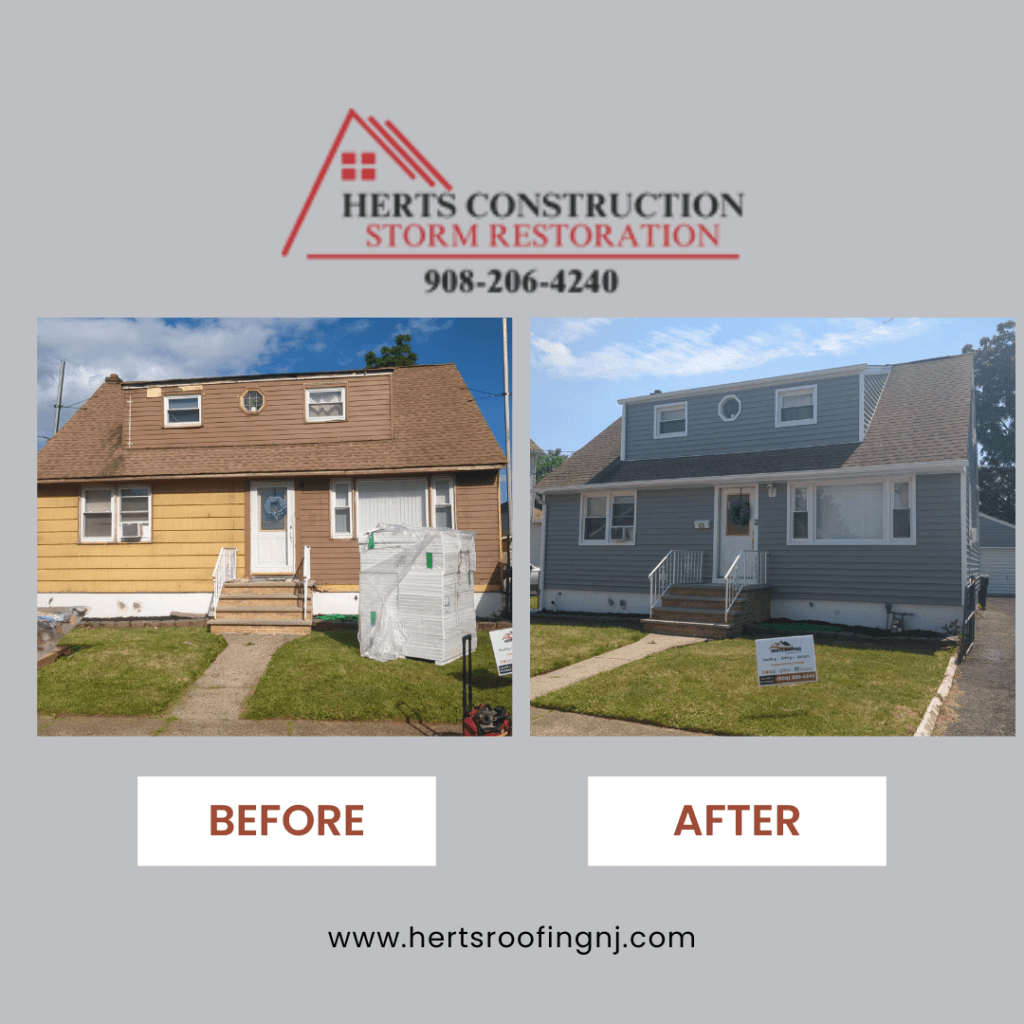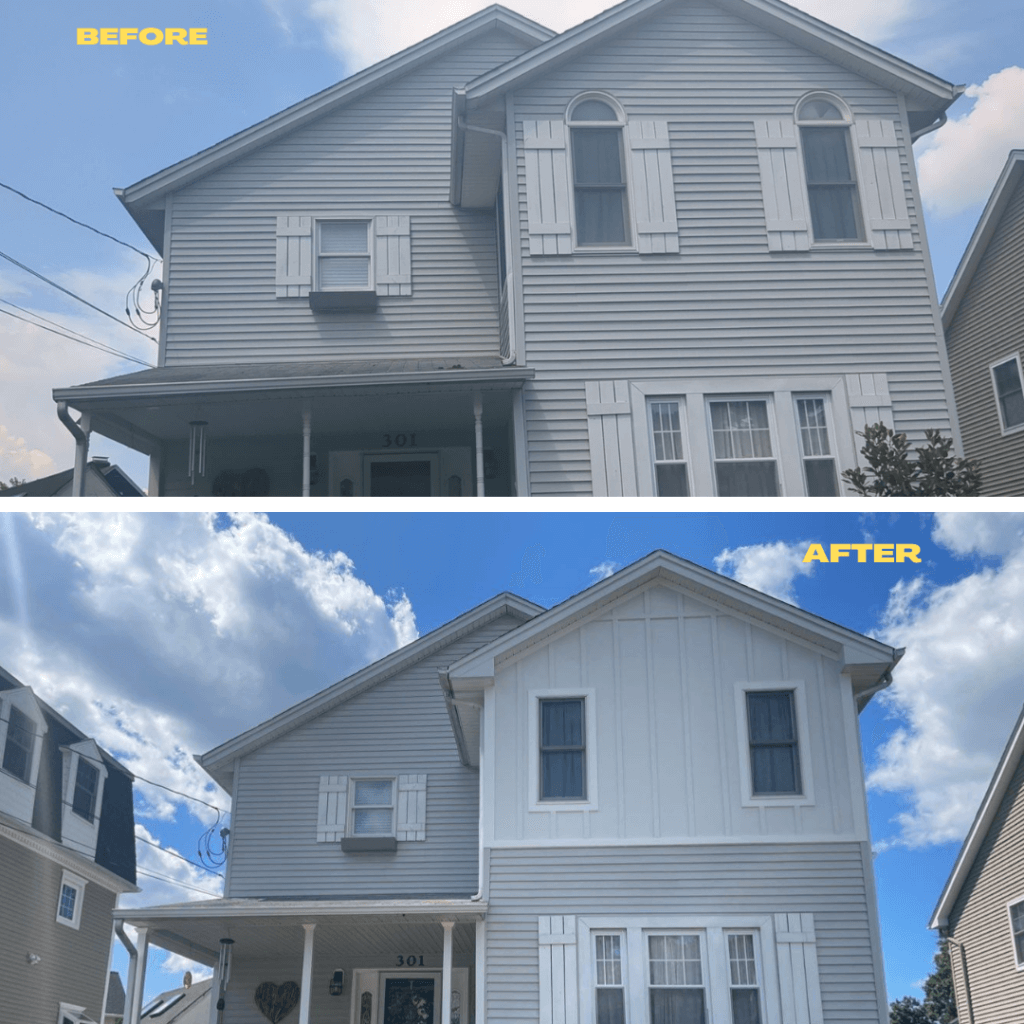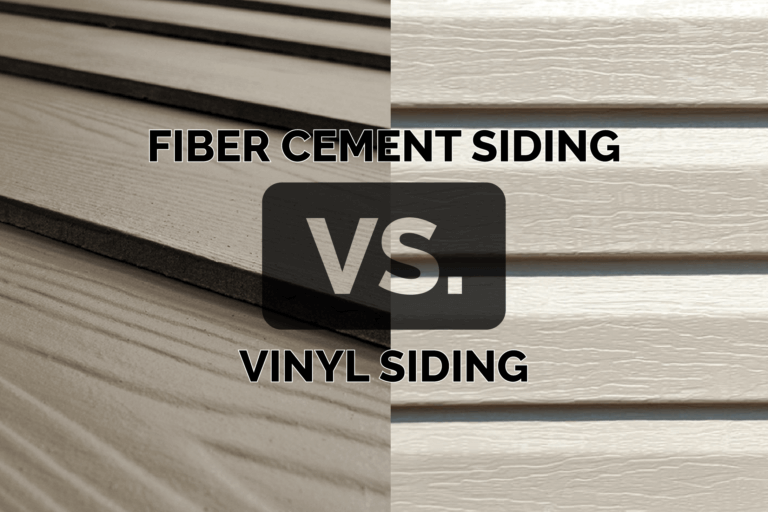Vinyl vs Fiber cement
Are you tired of your home’s exterior looking worn and outdated? Choosing the right siding for your New Jersey home can make all the difference in its appearance, durability, and value. But with so many options available, how do you know which one is best?
Two popular choices that often come head-to-head are vinyl siding and fiber cement. Both have their merits, but which one truly stands out for homes in the Garden State? Whether you’re building a new home or considering a renovation, this decision can impact your property for years to come. From withstanding harsh winters to enhancing your home’s curb appeal, the right siding choice is crucial.
In this comprehensive guide, we’ll dive deep into the world of vinyl and fiber cement siding, exploring their pros and cons specifically for New Jersey homes. We’ll cover everything from climate considerations and installation processes to long-term value and environmental impact. By the end, you’ll have all the information you need to make an informed decision that will protect and beautify your home for years to come. Let’s get started!
Understanding Vinyl Siding

Now that you’re considering siding options for your New Jersey home, let’s dive into vinyl siding. This popular choice offers a range of benefits that might make it the perfect fit for your property.
Composition and Manufacturing Process
Vinyl siding is made from polyvinyl chloride (PVC), a durable and versatile plastic. The manufacturing process involves:
- Mixing PVC resin with additives
- Extruding the mixture into sheets
- Cutting and shaping the sheets
- Adding texture and color
This process results in a lightweight yet sturdy material that’s perfect for protecting your home’s exterior.
Available Styles and Colors
You’ll be pleased to know that vinyl siding comes in a wide variety of styles and colors to suit your taste:
| Style | Description |
|---|---|
| Horizontal | Traditional lap siding look |
| Vertical | Modern, sleek appearance |
| Shake | Mimics wood shake siding |
| Board and Batten | Rustic, farmhouse-style aesthetic |
With hundreds of color options available, you can easily find the perfect shade to complement your home’s architecture and your personal style.
Cost-effectiveness
One of the main advantages of vinyl siding is its affordability. You’ll find that vinyl siding typically costs less than fiber cement, both in terms of materials and installation. This makes it an attractive option if you’re working with a budget or looking to maximize your return on investment.
Durability and Lifespan
When it comes to durability, vinyl siding holds its own against New Jersey’s varied climate:
- Resistant to moisture, preventing rot and mold growth
- Withstands high winds up to 110 mph
- Doesn’t crack or chip easily
- Maintains color without fading for years
With proper maintenance, you can expect your vinyl siding to last 20-40 years, providing long-lasting protection for your home. This durability, combined with its low maintenance requirements, makes vinyl siding an excellent choice for many New Jersey homeowners.
Next, we’ll explore fiber cement siding to help you make an informed decision between these two popular options.
Exploring Fiber Cement Siding

Now that we’ve covered vinyl siding, let’s dive into fiber cement siding, a popular alternative for New Jersey homes. This versatile material offers a unique combination of durability, aesthetics, and performance.
Maintenance Requirements
Fiber cement siding is renowned for its low maintenance needs, making it an attractive option for busy homeowners. Here’s what you need to know:
- Annual cleaning with a garden hose and mild detergent
- Periodic touch-ups for minor chips or cracks
- Repainting every 15-20 years, depending on color and exposure
Customization Options
You’ll be pleased to know that fiber cement siding offers extensive customization possibilities:
- Wide range of colors and finishes
- Textures mimicking wood, stone, or brick
- Various styles including lap siding, shingles, and vertical panels
Fire Resistance Properties
One of the standout features of fiber cement siding is its exceptional fire resistance:
| Property | Rating |
|---|---|
| Fire Rating | Class A |
| Flame Spread Index | 0 |
| Smoke Developed Index | 5 |
These ratings make fiber cement an excellent choice for fire-prone areas or if you’re looking to enhance your home’s safety.
Weather Resistance and Longevity
In New Jersey’s variable climate, fiber cement siding stands up exceptionally well:
- Resistant to freeze-thaw cycles
- Withstands high winds up to 130 mph
- Doesn’t rot, warp, or expand in humid conditions
- Expected lifespan of 50+ years with proper maintenance
Material Composition and Production
Fiber cement siding is made from a mixture of:
- Portland cement
- Wood pulp fibers
- Sand
- Water
This unique composition results in a product that combines the strength of cement with the flexibility and lightweight nature of wood fibers. The manufacturing process involves mixing these ingredients, forming them into sheets, and curing them under high pressure.
With its durability, customization options, and impressive resistance to fire and weather, fiber cement siding is certainly a contender for your New Jersey home. Next, we’ll examine how these materials perform in New Jersey’s specific climate conditions.
Climate Considerations for New Jersey Homes
When choosing siding for your New Jersey home, it’s crucial to consider the state’s diverse climate. Let’s explore how vinyl and fiber cement siding perform in various weather conditions.
UV Protection in Summer Months
During New Jersey’s hot summers, your home’s siding needs to withstand intense UV rays. Here’s how vinyl and fiber cement compare:
- Vinyl Siding:
- Resistant to fading and discoloration
- Some premium vinyl options offer enhanced UV protection
- Fiber Cement:
- Naturally resistant to UV damage
- Color retention is excellent, especially with factory-applied finishes
| Siding Type | UV Protection | Color Retention |
|---|---|---|
| Vinyl | Good | Good |
| Fiber Cement | Excellent | Excellent |
Humidity and Moisture Resistance
New Jersey’s humid climate can take a toll on your home’s exterior. Here’s how each siding type handles moisture:
- Vinyl Siding:
- Highly resistant to moisture
- Doesn’t absorb water, reducing the risk of mold and mildew
- Fiber Cement:
- Engineered to resist moisture damage
- Requires proper installation and maintenance to prevent water infiltration
Impact of Harsh Winters
New Jersey winters can be harsh, with freezing temperatures and potential snow accumulation. Consider these factors:
- Vinyl Siding:
- Can become brittle in extreme cold
- May crack or warp under heavy snow loads
- Fiber Cement:
- Highly resistant to freeze-thaw cycles
- Maintains structural integrity in cold temperatures
Both vinyl and fiber cement siding offer advantages for New Jersey’s climate. While vinyl excels in moisture resistance and affordability, fiber cement provides superior durability in extreme temperatures. Consider your specific location and budget when making your decision. Now that you understand how these materials perform in New Jersey’s climate, let’s compare their installation processes.
Installation Process Comparison
When deciding between vinyl siding and fiber cement for your New Jersey home, it’s crucial to understand the differences in their installation processes. Let’s compare these options based on time, labor costs, required tools, and ease of installation.
Time and Labor Costs
Vinyl siding typically has the edge when it comes to installation time and labor costs:
- Vinyl: Quick installation, often completed in 1-2 days for an average home
- Fiber Cement: More time-consuming, usually taking 3-5 days for the same size home
This time difference directly affects labor costs, making vinyl a more budget-friendly option for installation.
Required Tools and Expertise
The tools and expertise needed for each material vary significantly:
| Aspect | Vinyl Siding | Fiber Cement |
|---|---|---|
| Tools | Basic hand tools, circular saw | Specialized cutting tools, dust masks |
| Expertise | Moderate skill level | High skill level, professional installation recommended |
Vinyl siding requires less specialized equipment, making it more accessible for DIY enthusiasts. However, fiber cement demands more expertise due to its weight and cutting requirements.
Ease of Installation
You’ll find vinyl siding generally easier to install:
- Lightweight and flexible
- Interlocking panels for simple assembly
- Less prone to cracking during installation
Fiber cement, while durable, presents more challenges:
- Heavier material, requiring more manpower
- Needs precise cutting to avoid chipping
- Requires careful handling to prevent breakage
Now that you understand the installation differences, let’s consider how these factors might impact the long-term value and ROI of your New Jersey home.
Long-term Value and ROI
When considering siding options for your New Jersey home, it’s crucial to evaluate the long-term value and return on investment (ROI) of both vinyl and fiber cement siding. Let’s explore how these materials stack up in terms of insurance premiums, resale value, and energy efficiency.
Insurance Premium Influences
The choice between vinyl and fiber cement siding can impact your home insurance premiums:
| Siding Type | Insurance Premium Impact |
|---|---|
| Vinyl | Moderate reduction |
| Fiber Cement | Significant reduction |
Fiber cement siding often leads to lower insurance premiums due to its fire-resistant properties and durability against extreme weather conditions common in New Jersey.
Impact on Home Resale Value
Your siding choice can significantly affect your home’s resale value:
- Vinyl Siding:
- Moderate increase in home value
- Appeals to budget-conscious buyers
- Fiber Cement:
- Higher increase in home value
- Attracts buyers looking for premium, low-maintenance options
Fiber cement siding typically offers a better ROI, with an average recoup of 77% of the installation cost compared to vinyl’s 68%.
Energy Efficiency Benefits
Both siding options can contribute to your home’s energy efficiency, but in different ways:
- Vinyl Siding:
- Insulated vinyl siding options available
- Can reduce heating and cooling costs
- Easier to add extra insulation during installation
- Fiber Cement:
- Natural thermal mass properties
- Better at regulating indoor temperatures
- Can be paired with additional insulation for enhanced efficiency
While both materials offer energy-saving benefits, fiber cement’s superior thermal properties often lead to greater long-term energy savings for your New Jersey home.
Now that you understand the long-term value and ROI of both siding options, let’s explore their aesthetic appeal and impact on curb value.
Aesthetic Appeal and Curb Value
Now that we’ve explored the long-term value and ROI of both vinyl and fiber cement siding, let’s dive into their aesthetic appeal and how they can enhance your New Jersey home’s curb value.
Texture and finish options
Both vinyl siding and fiber cement offer a variety of textures and finishes to suit your home’s style:
| Vinyl Siding | Fiber Cement |
|---|---|
| Smooth | Smooth |
| Wood grain | Wood grain |
| Shingle-look | Stucco |
| Vertical panels | Brick-look |
Fiber cement generally provides more authentic-looking textures, especially when mimicking wood or brick. However, vinyl has made significant improvements in recent years, offering increasingly realistic options.
Color retention over time
When it comes to color retention, fiber cement has a slight edge:
- Fiber cement: Paint typically lasts 15-20 years before needing a refresh
- Vinyl siding: May fade slightly over time, especially with darker colors
To maintain your home’s curb appeal, you’ll want to consider how well each material retains its color in New Jersey’s varied climate.
Traditional vs. modern looks
Both materials can achieve traditional or modern aesthetics:
- Traditional looks:
- Vinyl: Offers classic clapboard and shingle styles
- Fiber cement: Provides authentic wood-look options and traditional board-and-batten designs
- Modern looks:
- Vinyl: Sleek, wide planks and bold colors for contemporary homes
- Fiber cement: Smooth panels and architectural details for a cutting-edge appearance
Your choice between vinyl and fiber cement will depend on your personal style preferences and your home’s architecture. Remember, the right siding can significantly boost your New Jersey home’s curb appeal and potentially increase its value.
Maintenance and Repair
Now that we’ve explored the aesthetic appeal and curb value of both siding options, let’s dive into the practical aspects of maintaining and repairing vinyl and fiber cement siding for your New Jersey home.
Ease of replacement
When it comes to replacing damaged sections, vinyl siding has a clear advantage:
- Vinyl: Easy to remove and replace individual panels
- Fiber cement: More challenging, often requiring professional help
| Siding Type | Ease of Replacement | DIY-friendly |
|---|---|---|
| Vinyl | High | Yes |
| Fiber Cement | Moderate | Limited |
Vulnerability to damage
Both materials have their strengths and weaknesses in terms of durability:
- Vinyl: Resistant to rot and insects, but can crack in extreme cold or warp in high heat
- Fiber cement: Highly resistant to impact, fire, and pests, but can chip if hit hard enough
Painting and touch-up needs
Your painting requirements will differ significantly between these two options:
- Vinyl:
- Never needs painting
- Color is integrated throughout the material
- May fade over time, but can’t be repainted effectively
- Fiber cement:
- Requires repainting every 7-15 years
- Allows for color changes if desired
- Touch-ups are relatively easy
Cleaning requirements
Both siding types are relatively low-maintenance, but here’s what you need to know:
- Vinyl siding:
- Annual cleaning with a soft brush and mild soap solution
- Can be pressure washed on low settings
- Fiber cement:
- Yearly cleaning with water and mild detergent
- Avoid high-pressure washing to prevent damage
Remember, while vinyl siding offers easier maintenance overall, fiber cement provides more durability and flexibility in terms of appearance. Consider your priorities and lifestyle when making your choice for your New Jersey home.
Conclusion
Choosing between vinyl siding vs fiber cement for your New Jersey home is a significant decision that impacts your property’s aesthetics, durability, and value. Both options offer unique advantages, with vinyl siding providing cost-effectiveness and low maintenance, while fiber cement excels in durability and aesthetic versatility. Consider your budget, long-term goals, and New Jersey’s climate when making your choice.
Ultimately, the best siding option for your home depends on your specific needs and preferences. Whether you prioritize affordability and easy upkeep or long-lasting performance and design flexibility, there’s a siding solution that will enhance your home’s appearance and protect it for years to come. Consult with a professional siding contractor to assess your home’s unique requirements and make an informed decision that will benefit you and your property in the long run.
Contact Us at
Herts Roofing & Construction
908-206-4240




